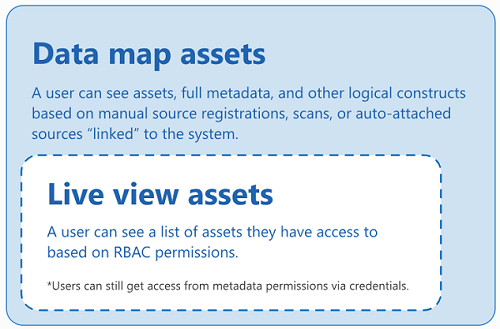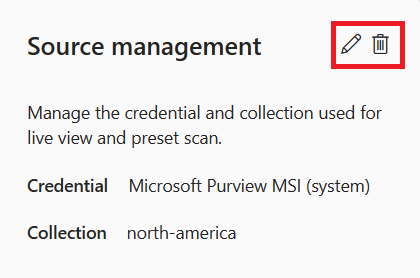Note
Access to this page requires authorization. You can try signing in or changing directories.
Access to this page requires authorization. You can try changing directories.
Important
This feature is currently in preview. The Supplemental Terms of Use for Azure Previews include additional legal terms that apply to Azure features that are in beta, in preview, or otherwise not yet released into general availability.
Some Azure resources are available to be seen in live view.
In this article we'll cover:
- What resources have live view available
- What metadata is available in live view
- Who has permissions to live view resources
- Next steps to govern live view resources
Limitations
- Live view for Microsoft Fabric limitations:
- Personal workspaces aren't supported yet in live view.
- Only Microsoft Fabric item level metadata are available in live view.
- Power BI Datasets don’t support showing schema in live view if the item hasn’t been scanned.
- Dataflow Gen2 (Preview) items are displayed as Dataflow items.
What resources have live view available?
Live view resources in the same tenant as your Microsoft Purview account are automatically accessible for users in your catalog. These resources have live view available:
| Resource | Level of view available |
|---|---|
| Azure Blob Storage | Storage account, Azure Blob Service, Container |
| Azure Data Lake Storage Gen 2 | Storage account, Azure Data Lake Storage Gen2 Service, File system |
| Azure SQL Database | Server, Database, Schema, Tables, Columns |
| Azure Subscriptions | Live view assets in the subscription |
| Microsoft Fabric | Workspace, Item |
Users with permissions can browse and search for these assets in the catalog without needing to set up a scan.
Metadata available in live view
Resources in live view in the catalog automatically have this metadata available:
- Name
- Properties
- Schema
- Lineage
Live view permissions
Users that have permissions on the available resources are automatically able to access these resources in the catalog as either data readers or data owners. No other permissions in Microsoft Purview are required.
Data readers
These are the permissions needed on the resources for a user to be able to see it as a reader in live view in Microsoft Purview.
| Data source | Reader permission |
|---|---|
| Azure SQL Database | Reader role in Azure |
| Azure Blob Storage | Reader role in Azure |
| Azure Data Lake Storage Gen2 | Reader role in Azure |
| Azure Subscription | Read permission on subscription |
Data owners
These are the permissions needed on the resources for a user to be able to see it as an owner and curate its metadata in live view in Microsoft Purview.
| Data source | Owner permission |
|---|---|
| Azure SQL Database | "Microsoft.Sql/servers/write", "Microsoft.Sql/servers/databases/write", "Microsoft.Authorization/roleAssignments/write" |
| Azure Blob Storage | "Microsoft.Storage/storageAccounts/write", "Microsoft.Authorization/roleAssignments/write" |
| Azure Data Lake Storage Gen2 | "Microsoft.Storage/storageAccounts/write", "Microsoft.Authorization/roleAssignments/write" |
Update schedule
To update the schedule of a preset scan either:
Select Customize schedule before selecting the toggle. You'll set your scan schedule and then the preset scan will be automatically enabled.
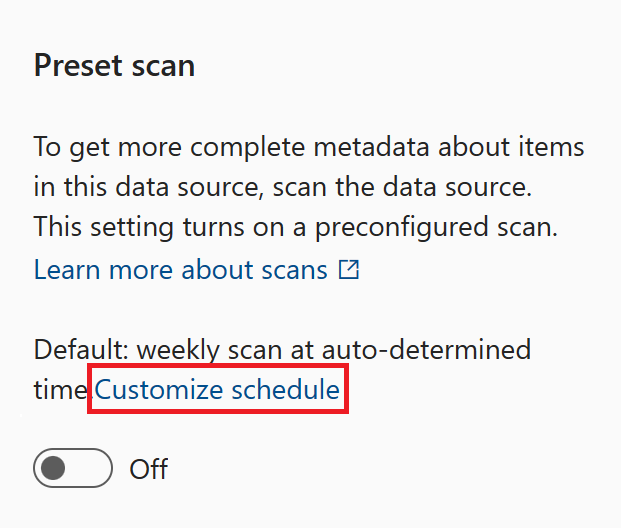
Select the Edit pencil next to the schedule label after enabling the preset scan
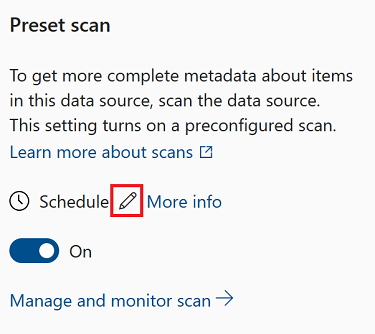
Then you can set your schedule to run monthly or weekly on specified days. Select Apply to apply the schedule to the scan.
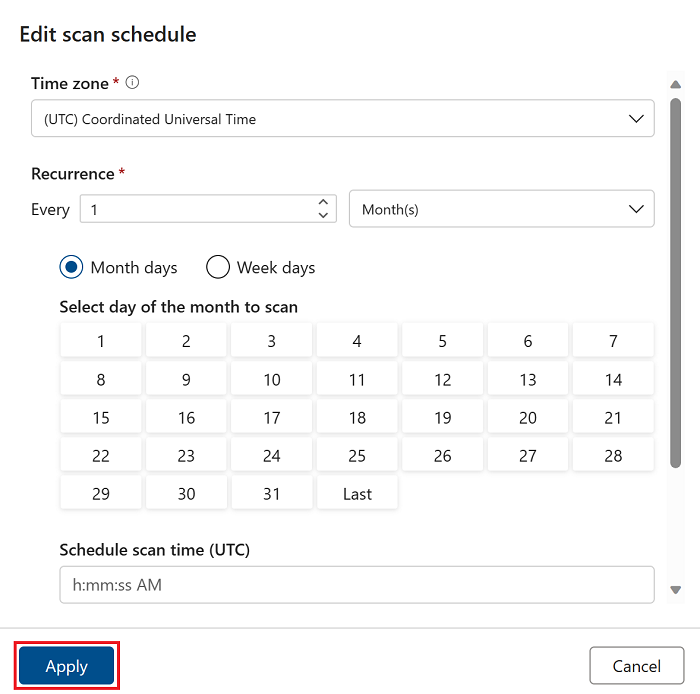
Manage live view credentials
If you have extended live view permissions or run a preset scan your live view resource will have credentials that allow Microsoft Purview to access it.
If you need to update or remove those credentials, you can use the Source management window.
Browse the catalog for the source where you want to run a preset scan to enhance the metadata.
Select the data source.
Under source management, you can see your credential and collection listed, and the buttons to edit or delete the credentials.
Select the Edit pencil icon to update the credentials.
Note
You can't change the collection the source is mapped to.
Select Delete to remove the credentials.
Note
Deleting credentials will also disable extended live view permissions or preset scans.
